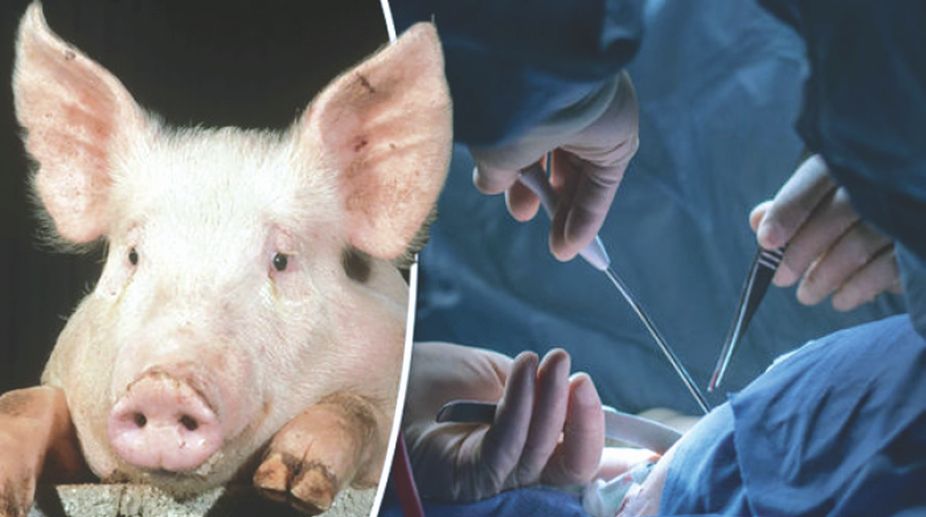A Cold-Weather Skincare Routine, Backed by Chemistry
Spring 2024
 Introduction
Introduction
There is a worldwide shortage of donated human organs
for transplant. About seventeen people die waiting on
transplant lists every day. In this human organ
shortage, people have developed new medical advances to
address this issue, one being xenotransplantation. This
is a promising new treatment that entails the
transplantation of an organ from a nonhuman animal into
a human. This treatment could significantly increase the
number of organs for transplant, leading to less
life-threatening waiting, cost for care, and exposure to
further disease from immunocompromised states.
Xenotransplantation has been performed with a 57-year-old patient, David Bennett, with life-threatening heart disease. This was the first successful transplant of a pig's heart into a human. To make this transplant a success the pig heart had ten genetic modifications. Newer technologies such as gene editing and cloning have allowed altered pig organs to be less likely rejected in the human body. However, slight genetic variations in pigs can be detrimental to humans, making xenotransplants dangerous. The patient died two months after the transplant knowing death was a likely outcome, but this treatment is still an exciting, viable new possibility.
Xenotransplantation has been performed with a 57-year-old patient, David Bennett, with life-threatening heart disease. This was the first successful transplant of a pig's heart into a human. To make this transplant a success the pig heart had ten genetic modifications. Newer technologies such as gene editing and cloning have allowed altered pig organs to be less likely rejected in the human body. However, slight genetic variations in pigs can be detrimental to humans, making xenotransplants dangerous. The patient died two months after the transplant knowing death was a likely outcome, but this treatment is still an exciting, viable new possibility.
 In addition to this, on March 16th 2024, the world’s first
genetically edited pig kidney was transplanted into a 62
year old man, Richard Slayman, with end stage kidney
disease at Massachusetts General Hospital (MGH). The
kidney had 69 genetic modifications and was edited using
CRISPR-Cas9 technology to remove dangerous pig genes and
add specific human genes to make it more compatible to the
recipient. Additionally, scientists eliminated porcine
endogenous retroviruses in the pig donor to remove the
risk of infection in humans. Slayman saw this treatment as
a way “to provide hope for the thousands of people who
need a transplant to survive.” This treatment was offered
under compassionate use protocol by the FDA, and if it is
a success will greatly increase how fast
xenotransplantation can become a widely offered option.
In addition to this, on March 16th 2024, the world’s first
genetically edited pig kidney was transplanted into a 62
year old man, Richard Slayman, with end stage kidney
disease at Massachusetts General Hospital (MGH). The
kidney had 69 genetic modifications and was edited using
CRISPR-Cas9 technology to remove dangerous pig genes and
add specific human genes to make it more compatible to the
recipient. Additionally, scientists eliminated porcine
endogenous retroviruses in the pig donor to remove the
risk of infection in humans. Slayman saw this treatment as
a way “to provide hope for the thousands of people who
need a transplant to survive.” This treatment was offered
under compassionate use protocol by the FDA, and if it is
a success will greatly increase how fast
xenotransplantation can become a widely offered option.
Other approaches being used to meet the never-ending need for organ transplants include organoids and presumed consent. Organoids are small three-dimensional tissue cultures that are grown from stem cells. They can be manipulated to copy the complexity of an organ or to express parts of it such as producing only certain types of cells. Eventually, continued developments in this field might facilitate the end of the organ shortage. They also provide insight into human development and disease and allow scientists to see how medicines interact with organoids to open new approaches to personalized medicine.
"under what conditions, if any, can xenotransplantation be
an ethically appropriate treatment?"
A few governments have attempted to address the shortage
of organs donated for transplant by legislation that
presumes consent to the use of a patient’s organ for
transplant. It is an “opt out” system rather than
explicitly choosing to donate by “opting in.” Presumed
consent means that unless the deceased has expressed that
they do not want to be an organ donor then consent will be
assumed. Several countries such as Spain, Sweden,
Portugal, and Austria have legalized presumed consent.
While these two developing fields are important and intriguing on their own, in this paper I will focus on xenotransplantation: under what conditions, if any, can xenotransplantation be an ethically appropriate treatment?
 Relevant Facts
Relevant Facts
Xenotransplantation is any treatment that entails the
transplantation, implantation, or infusion into a human
recipient of either live cells, tissues, or organs from
a nonhuman animal source. For example, pig-to-human
xenotransplantation requires breeding genetically
specific pigs, raising them in controlled conditions,
and killing them to harvest their organs. Experiments
led to the use of specifically pig organs, as pigs offer
advantages over primates for transplants because they
are easier to raise and become adult human size in
merely six months.
The American Medical Association has specific guidelines for physicians and researchers when it comes to this treatment. The AMA states that such professionals have an obligation to contribute to efforts to increase the supply of organs available for transplantation, but they must protect the interests of patients and the welfare of the public. The doctors and researchers need to follow certain guidelines to protect the patients and make sure they understand the nature of this experimental treatment. Requirements include, encouraging education and public discussion of xenotransplantation because of the unique risks, ensuring that research is well funded to ensure lifelong surveillance of xenotransplant recipients, that recruitment is selective to patients with serious or life-threatening conditions, and if there is participation by individuals who lack decision-making capacity, important measures are taken to protect their interests.
The American Medical Association has specific guidelines for physicians and researchers when it comes to this treatment. The AMA states that such professionals have an obligation to contribute to efforts to increase the supply of organs available for transplantation, but they must protect the interests of patients and the welfare of the public. The doctors and researchers need to follow certain guidelines to protect the patients and make sure they understand the nature of this experimental treatment. Requirements include, encouraging education and public discussion of xenotransplantation because of the unique risks, ensuring that research is well funded to ensure lifelong surveillance of xenotransplant recipients, that recruitment is selective to patients with serious or life-threatening conditions, and if there is participation by individuals who lack decision-making capacity, important measures are taken to protect their interests.
Sources:
O’Reilly, “Xenotransplantation and the AMA Code of
Medical Ethics,” American Medical Association.
Center for Biologics Evaluation and Research, “Xenotransplantation,” U.S. Food and Drug Administration, March 3, 2021, https://www.fda.gov/vaccin
Rabin, “In a First, Man Receives a Heart From a Genetically Altered Pig,” The New York Times.
Kevin B. O’Reilly, “Xenotransplantation and the AMA Code of Medical Ethics,” American Medical Association, August 21, 2017 https://www.ama-assn.org/delivering-care/ethics/xenotransplantation-and-ama-code-medical-ethics.
Brandon Chase, “World’s First Genetically-Edited Pig Kidney Transplant into Living Recipient Performed at Massachusetts General Hospital,” Massachusetts General Hospital.
Javier Barbuzano, “Organoids: A New Window into Disease, Development and Discovery,” Harvard Stem Cell Institute (HSCI), November 7, 2017, https://hsci.harvard.edu/organoids.
Simon Bramhall, “Presumed Consent for Organ Donation: A Case Against,” National Library of Medicine, May 2011
Roni Caryn Rabin, “In a First, Man Receives a Heart From a Genetically Altered Pig,” The New York Times, January 10, 2022,
Rabin, “In a First, Man Receives a Heart From a Genetically Altered Pig,” The New York Times.
Brandon Chase, “World’s First Genetically-Edited Pig Kidney Transplant into Living Recipient Performed at Massachusetts General Hospital,” Massachusetts General Hospital, March 21, 2024,
Penn Medicine, “6 Quick Facts About Organ Donation,” Penn Medicine, March 21, 2023,
Center for Biologics Evaluation and Research, “Xenotransplantation,” U.S. Food and Drug Administration, March 3, 2021, https://www.fda.gov/vaccin
Rabin, “In a First, Man Receives a Heart From a Genetically Altered Pig,” The New York Times.
Kevin B. O’Reilly, “Xenotransplantation and the AMA Code of Medical Ethics,” American Medical Association, August 21, 2017 https://www.ama-assn.org/delivering-care/ethics/xenotransplantation-and-ama-code-medical-ethics.
Brandon Chase, “World’s First Genetically-Edited Pig Kidney Transplant into Living Recipient Performed at Massachusetts General Hospital,” Massachusetts General Hospital.
Javier Barbuzano, “Organoids: A New Window into Disease, Development and Discovery,” Harvard Stem Cell Institute (HSCI), November 7, 2017, https://hsci.harvard.edu/organoids.
Simon Bramhall, “Presumed Consent for Organ Donation: A Case Against,” National Library of Medicine, May 2011
Roni Caryn Rabin, “In a First, Man Receives a Heart From a Genetically Altered Pig,” The New York Times, January 10, 2022,
Rabin, “In a First, Man Receives a Heart From a Genetically Altered Pig,” The New York Times.
Brandon Chase, “World’s First Genetically-Edited Pig Kidney Transplant into Living Recipient Performed at Massachusetts General Hospital,” Massachusetts General Hospital, March 21, 2024,
Penn Medicine, “6 Quick Facts About Organ Donation,” Penn Medicine, March 21, 2023,


